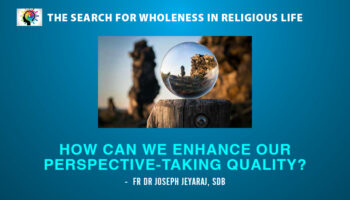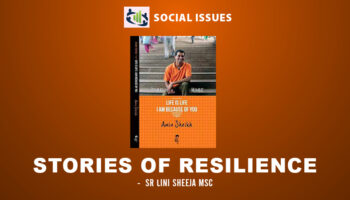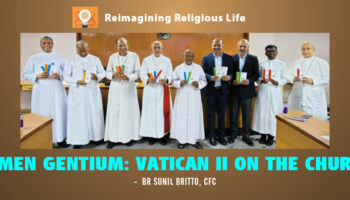People suffering from mental illness and distress need our urgent attention and help, say the Australian Bishops
08 August 2020
In this Social Justice Statement, To Live Life to the Full: Mental Health in Australia Today, the Catholic Bishops of Australia encourage faith communities, governments and each one of us, to make mental health a priority.
In the foreword, Archbishop Mark Coleridge, President of Australian Catholic Bishops Conference, has highlighted the present major factor impacting mental health – the COVID-19 pandemic. Many of us, he says, will experience a mental health problem at some point in our lives – and this may well be the time.
They are “Us”
We all need the bonds of family, friends and the broader community to celebrate the joys and hopes of life. These bonds help us to face the usual challenges of life, but they are even more important in times of anxiety or despair. Therefore, the need to understand that people experiencing mental ill-health are not some ‘other’ people; they are ‘us.’ People in our families, faith communities, workplaces and society are suffering mental ill-health – and they can be of any age or socio-economic background.
The document includes first-person narrations from those suffering from various forms of mental illness, as well as practitioners and pastoral ministers who assist folks struggling with mental health issues. It also impressively engages both the best of medical and scientific research as well as the Catholic theological and pastoral tradition.
The Australian bishops also go to great length to successfully make clear that “mental ill-health is not a moral failure, the result of a lack of faith, or of weak will,” adding, “Jesus himself was labelled mad (Mark 3:21; John 10:19) and, like us, he suffered psychological distress (Luke 22:44; Matthew 26:37; Mark 14:33; John 12:27).”
Prevalent Among the Young
The document also demonstrates that the feedback from young adults in 2017 ahead of the 2018 Synod of Bishops was not in vain. The bishops actually listened to the young people and published their own report summarizing the results! The mental health document begins with the experience and wisdom of these young Australians, noting that they listed “mental health, followed by school or study, drugs and alcohol, and body image, as the main issues facing young people today.”
It builds on the young adults’ feedback by noting other populations that also suffer, including older people, families struggling with divorce, pregnancy issues, or domestic violence, and other historically disenfranchised communities, such as refugees, asylum-seekers and the Aboriginal and Torres Strait Islander communities. By and large, the same situation is prevailing in other countries too.
The Australian bishops note the national history of governmental policies that have made access to mental health care less readily available, rightly calling this trend a justice issue and a life issue. Furthermore, they name intersecting factors that compound mental health suffering, such as economic instability and the growing “gig economy,” homelessness, incarceration, climate change and, most acutely, the novel coronavirus pandemic, among others.
Factors Causing Mental Distress
Other than the ravaging pandemic, there are many other uncontrollable disorders, unprecedented hazards in the world that lead to mental illness. Prolonged drought has hit rural communities, threatening livelihoods, straining local economies and eroding community networks. ‘Environment-related’ anxieties have led to resignation and loss of hope. The recent bushfires wiped out entire communities. Lives were lost, communities displaced, homes and businesses were destroyed. The greater frequency and intensity of weather-related disasters amplify the impact climate change is having on mental health. Many immigration detainees already experience poor mental health as a result of the disasters and wars, persecution and torture from which they have fled.
The number of people experiencing or at risk of mental ill-health has increased during this period of pandemic. Many more will be distressed or relive previous trauma through the impact the virus is having in their lives.
The document’s directness, honesty and humility make an important contribution to the de-stigmatizing of mental illness and models for Catholics—and all people of goodwill—a way of discussing, sharing and responding to the needs of sufferers without shame. The significance of this cannot be overstated.
The Real Cost of Mental Illness
The real cost of mental illness is far more than economic. It is felt in the stigma and discrimination experienced by the most vulnerable–being labelled, shunned, denied support, or not even being recognised. This denies a person’s human dignity and one’s right to live life to the full. It is a rejection of the gifts that they have to offer and their membership in the Body of Christ. The statement says that parishes, organisations and communities can be places of acceptance, inclusion, care and healing, not places of rejection, judgment or stigma against those experiencing mental health issues. Furthermore, as Pope Francis constantly reminds us, we have to take the initiative to go out to those pushed to the edges, rather than waiting for them to come to us seeking welcome.
The stigma associated with mental ill-health can be as debilitating as the symptoms of the illness. Negative stereotyping of mental illness can have a huge impact socially. People are often avoided, excluded or experience dismissive treatment at community gatherings. Meanwhile, in the workplace people with mental ill-health can be judged incompetent and denied opportunities for advancement. If Jesus embraced our human experiences, including mental distress, and being called insane, can we not welcome and value those who are living through such distress today?
The Need to Build a Caring Community
The significant theme of the letter is its emphasis on the need to build a caring community for those who are mentally ill. In the late twentieth century, Australia began closing its mental health hospitals and reintegrating people into the community to receive medical and psychosocial support. This process reduced the number of acute psychiatric beds from 30,000 in the 1960s to around 6,000 by 2005. Hence, there is a need for a ‘normal community environment’ for people experiencing mental illness. For this, the commitment of governments to the humanitarian principle of community integration has a major role to play.
There are many accounts of psychological distress in the Bible where community integration proves vital. God’s response to Elijah suggests an integrated approach to mental health. The story of Naomi and Ruth highlights the importance of social support in times of psychological distress. In neither case does God chastise the one who is suffering or coax them to pray more or to repent of sin! The account of the Gerasene demoniac is a story of the dignity of the person-in-community. The man himself, while still ill, takes the initiative and runs towards Jesus (Mark 5:6-7). When he is cured, the man is restored not only to health, but also to community. He is freed from the stigma of mental ill-health. Furthermore, he is invited to participate in Jesus’ mission and becomes a witness. He is sent out to proclaim God’s action in his life (Mark 5:19-20).
Not everyone who experiences mental illness will recover, but all share in Jesus’ promise of the fullness of life (John 10:10). If we seek only to cure, rather than to accompany people experiencing mental ill-health, we will be of no help to people seeking meaning in their experience. We will not notice the action of God in their lives or learn what they have to teach us.
During this time of pandemic, we have often heard it said that “we are all in this together”.
Citing Pope Francis, the statement says that the test of our society’s commitment to the common good is the care we show for the people who are most vulnerable or disadvantaged.
From Stigma to Loving Relationships
A commitment to the common good means attending to the good of all of us, without exception. It means paying special attention to those who are most often overlooked, pushed aside, or fall through the gaps. The common good is both universal and intergenerational because the human dignity of people does not depend on their location in time or space. As the COVID-19 pandemic has made painfully clear, we are one human family. We are called to loving relationships with all people regardless of nationality or visa status.
It is surely time for us to make mental health a real priority. In our parish communities, our institutions and throughout the Church, we have a duty to break through the stigma of mental illness. Together, we promote the fullness of life for all when we ensure appropriate care for everyone experiencing mental ill-health.
Our society tends to push away or draw away from those who confront us with our frailties and limitations. This is not the way of Jesus. We need to, like him, draw near to those who are experiencing mental ill-health and acknowledge that they are members of the Body of Christ–‘they’ are part of ‘us.’ Only then can we say, ‘we are all in this together.’ Only then can we ‘live life to the full.’
Mental health is an urgent issue—not just in Australia, but all over. We, members of the Indian Church, can learn from the sensitivity and concern of the Australian bishops. What are we doing for our brothers and sisters suffering from mental sickness or distress? Do we see them as “outsiders” or as part of us? Are we a caring community?
AUTHENTICUM CHARISMATIS:
New Directives on the Founding of Religious Orders
Any religious order belongs to the whole church—not simply to a diocese or locality. The real approving authority, therefore, is the Vatican, not the local bishop.
In a “Motu Proprio” dated November 4, 2020, Pope Francis has ordered the implementation of stricter oversight on the creation of new religious orders. [“Motu proprio” refers to a document issued by the pope on his own initiative and personally signed by him.]
The pontiff has modified Canon 579 of the Code of Canon Law, which concerns the creation of religious orders and congregations. The new law requires a bishop to have permission from the Holy See prior to establishing a new religious institute in his diocese.
Pope Francis cited the Apostolic Exhortation “Vita consecrata” that states that the vitality of new institutes and societies “must be judged by the authority of the Church, which has the responsibility of examining them in order to discern the authenticity of the purpose for their foundation and to prevent the proliferation of institutions similar to one another, with the consequent risk of a harmful fragmentation into excessively small groups.” The new Institutes of Consecrated Life and the new Societies of Apostolic Life, therefore, must be officially recognized by the Apostolic See, which alone has final judgement.
In recent years, the Vatican has cracked down on founders of some religious orders and lay institutes after they were found to have been frauds who sexually or spiritually abused their members. In his letter released on November 4, the pontiff said it is the responsibility of the Apostolic See to accompany the pastors in the process of discernment leading to the ecclesial recognition of a new institute or a new society under diocesan law.
SR THERESA PHAWA FMA
To subscribe to the magazine, click Subscribe





